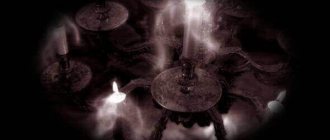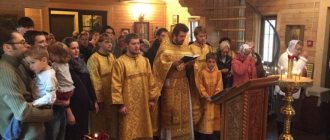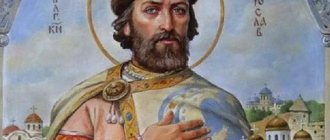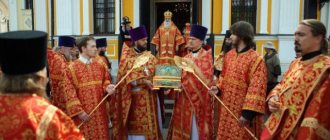Yaroslav Alekseevich Shipov (January 16, 1947) - Russian writer, since 1991 - priest of the Russian Orthodox Church. Member of the USSR Writers' Union since 1983, then member of the Russian Writers' Union. Laureate of the Patriarchal Literary Prize (2016). In 2007 he was awarded the Order of St. Sergius of Radonezh III Art. In 2013 he was elevated to the rank of archpriest.
Shipov’s father and mother are journalists, both participants in the Great Patriotic War, who met while working in the magazine “Bezbozhnik” (https://pravoslavie.ru/106031.html). He spent his childhood and youth in Moscow, and graduated from the Literary Institute in 1974. In 1976, his first story, “Journey to the Front Line,” was published in the magazine “Rural Youth.” From 1979 to 1981 he worked at the magazine “Our Contemporary”, then at the publishing house “Sovremennik”.
In 1981, the publishing house "Young Guard", which actively published beginning authors, published Shipov's first book. For her, the young writer was awarded an honorary prize named after A.M. Gorky, awarded by the Central Committee of the Komsomol and the Union of Writers of the USSR. In the 1980s, he actively published in the magazines “Our Contemporary”, “Moscow”, “Rise”, “Russian House”, “Literary Study”, in the newspapers “Literary Newspaper” and “Literary Russia”. Books of this period: the books “The Third Day Was Walking” (1984), “Western Outskirts” (1986), “The District Wonderworker” (1990).
In 1991, Shipov was ordained a priest in the Vologda diocese and served as a rural priest in the Tarnog region for 4 years. The impressions of these years and observations of the life of the village parish provided the basis for his new prose books “You Have No Right to Refuse” (2000) and “Length of Days” (2002). In them, he tells with particular depth and insight about the modern day of the northern peasantry. The style of his stories is laconic and psychologically reliable. Shipov depicts the complex spiritual world of his heroes with special warmth and trust (https://www.hrono.ru/biograf/bio_sh/shipov_yar.php).
Currently serving and living in Moscow. Famous books: “Paradise Farms and Other Stories”, “First Prayer”, “Orthodoxy. Schoolchild's Dictionary.
Priest Yaroslav Shipov (S. Kosygin)
Shipov Yaroslav Alekseevich (b. 01/16/1947), priest, writer and public figure. Graduated from the Literary Institute in Moscow. He worked in the magazines “Literary Studies”, “Our Contemporary”, and in the publishing house “Sovremennik”. At the age of 44 he became a priest. He raised parishes in the Vologda region.
O. Yaroslav is the author of short stories and stories “Journey to the Front Line” (1981), “It was the Third Day” (1984), “Western Outskirts” (1986), “District Wonderworker” and others. In the 1990s he was a member of the editorial staff collegium of the magazine "Our Contemporary".
* * *
Imagine a young promising Moscow writer working in one of the best publishing houses in the capital - Sovremennik. He publishes a lot in magazines, he has books published... True, in addition to literature, another passion lives in the soul of Yaroslav Shipov - hunting. He leaves Moscow and buys a house in the Tarnogsky district of the Vologda region, on the Kokshenga River. Even by local standards, this region is remote and remote. Vologda poetess Olga Fokina wrote: “And on Tarnoga, ah, on Tarnoga there is no postal service or goods.” Already during the perestroika years, local residents decided to restore the temple. Yaroslav Shipov became an intercessor from the Orthodox community. The Vologda bishop noticed him and persuaded him to accept ordination.
So Yaroslav Shipov, a native Muscovite, member of the Russian Writers' Union, became Father Yaroslav in the distant Vologda church. Here is another example of the amazing Russian fate... Years have passed. Now Father Yaroslav is a priest in the Moscow Znamensky Cathedral in Zaryadye, and on weekends he serves in the Church of the Intercession, better known as St. Basil's Cathedral on Red Square. But Father Yaroslav did not give up writing. On the contrary, his stories increasingly began to be published in the capital. His new book was recently published, which consisted of two cycles of stories: “You have no right to refuse” and “Length of days.”
Yaroslav Shipov's prose is traditional. The heroes of the stories are church parishioners, Vologda peasants, city dwellers, and priests. Each of the short stories describes the fate of a person, our contemporary. And the main character, on whose behalf the story is told, is the priest himself. The priest’s discerning, kind gaze radiates care and concern; he truly nourishes his flock with words of consolation and hope. The author tries to understand a person, to see his actions, often unseemly, in a new light.
Light prose with gentle humor is a rarity in modern hard literature. It can be read in one breath, revealing to us the world of human passions, inspired by the author’s position - to do good.
Sergey Kosygin www.ruscenter.ru
Yaroslav Shipov - First prayer (collection of stories)
Priest Yaroslav Shipov
First Prayer (story collection)
Ravelin
This house has been preserved. And to this day, passengers of long-distance trains, constantly scurrying in both directions, can observe through the windows of the cars an outlandish structure, reminiscent of a powerful pillbox, to which the daring architect tried to give the features of a classic European cottage.
In front of the house, with its facade facing the railway, there is one row of poplars - the same age as the house, which have long outgrown its two-story height. And there is nothing else nearby: no buildings, no electricity poles. Therefore, an attentive observer cannot help but be surprised and wonder: what kind of life is possible in this fortification structure, when it is located in such an uninhabited and even deserted place?.. The attentive observer will be right: there is no life here.
But it was. There was electricity, there was a well, a bathhouse, a barn, there was a road, a crossing, a barrier, a switchman's hut, a switch, a branch for peat mining, another switch and a dead end... And in the house itself, life-beaten, cheerful people often gathered, calling the house a ravelin [1].
And the ravelin had an owner: military pilot Ermakov, who flew over German soil a lot and after the war intended to build a house like the German ones, but stronger. Without a project, just by creative will, but that turned out to be enough.
Military pilot Ermakov, nicknamed Ermak for short (his name was forgotten as unnecessary), has always been attractive to me. Probably because something was embodied in his life that I would have wanted, but was not granted. This life was divided in my perception into two: airplanes and hunting.
There was, however, another part, maybe even an era, that lasted only three days, but it exists separately, because it contains an incredible miracle.
As for the architectural research of the heroic military flight, they, with all their undoubted artistic audacity, cannot claim to be an independent part. Although they reflect some features of this original personality.
In aviator circles, Ermakov was a fairly famous person. Some military historians associate his name with an incident that revealed the unexpected capabilities of the Il-2 attack aircraft. And it was like this. Returning from a mission, brand new attack aircraft that had just entered service came under fire. One of them received significant damage, fell behind his own and barely pulled over the forest road to the front line. A column of enemy infantry appeared ahead, heading to the front line. The ammunition was spent, and the pilot, having dropped to two and a half meters, passed over the column... When he returned, it was discovered that a group of designers had arrived at the regiment who wanted to find out how the new aircraft performed in combat conditions. They had already questioned the other pilots who had returned earlier, and now they pounced on the riddled car, which they no longer expected to wait for.
Everything about the holes was clear to them, but it was not clear why the fuselage was stained with some scraps and why the propeller blades were half chewed off. The pilot was forced to report the whole truth and, presumably, expected punishment, because usually the truth results in constant punishment from the authorities, but contrary to expectation and contrary to all sense, this time there was no punishment: both the generals and the guys in black civilian coats were silent, - and it was unknown what technological considerations were taking place in their design heads.
Then one asked:
— And how did the car behave under these parameters?
“Like an iron[2],” the pilot answered dejectedly. And it seems that his answer contained a certain scientific precision, because the faces of both generals and civilians instantly brightened.
- Yes, that’s what! — the pilot perked up. “We were here when we were celebrating the birthday of our commander…” he was about to say something even more impressive, but the regiment commander frantically turned the conversation to another topic.
Now, of course, you cannot reliably establish whether Ermakov fought in this way or not Ermakov. Or maybe Ermakov, and someone else, and a third... But he fought a lot and fought until the Golden Star.
After the war, he mastered another extremely remarkable aircraft - the Il-28, on which many military and civilian pilots grew up. The plane was obedient and easy to control, like a tractor, but its fate turned out to be sad: all the machines were destroyed during the disarmament started by Nikita Khrushchev - the first in a series of graceless rulers who could not accommodate either the geography of Russia or its history. Ermakov served as an instructor pilot until the “twenty-eighths” disappeared, then he retired and henceforth was engaged only in hunting.
Actually, the ravelin was built mainly for hunting. The fact is that the peat quarries mined in those places eventually filled with water, became overgrown with bushes and turned into wonderful hunting grounds. The writer Prishvin, who, as is known, knew a lot about hunting, visited those parts and, according to rumors, stopped at the ravelin more than once.
It must be said that in those days only a select few were considered real hunters, that is, those for whom hunting was an irresistible passion, like love, and maybe even stronger, in a word, worse than bondage.
There were also “butchers” who chased meat, usually elk, and, finally, hunters who professionally hunted fur-bearing animals. If real hunters treated the “fur hunters”, albeit without enthusiasm, but with respect, then the “butchers” were openly despised: hunting is a festival of passion, and passion is always wasteful... What kind of profit can there be here? And the “butcher”, no matter the weather, could not get into the company of woodcock lovers or, say, horse racers. That is, the path to decent society was forever barred to him.
Ermakov, of course, was one of the real hunters, which is why he built his ravelin in this place: duck hunting is a gambling business, just have time to lubricate and reload. He kept company with a variety of people, but there were two main friends: a childhood friend who became a famous writer, and a distant relative who became a big railway boss. Without this relative, by the way, the ravelin would not have been built - go ahead and bring cement, bricks, boards into such a wilderness... But all this was easy for him - he even went hunting in a separate carriage: in Moscow the carriage was hooked up to a fast train, on the station closest to Ravelin - they uncoupled it, and then the cuckoo engine delivered the car to a dead end.
Having built the ravelin, Ermakov began to disappear in it, first for weeks, and then, as his relationship with his wife worsened, for months. The wife came “to the dacha” only once and immediately hated both the damp lowland stretching to the very horizon, so dear to Ermakov’s heart, and the house itself, which, for all its external intricacy, was unusually cozy inside.
It seems, however, that the reason was not the dull landscape or the gloom of the ravelin, but the fact that in the relations of these people, goodwill began to give way to hostility.
Why things turned out this way - I don’t know, I only know that Ermakov’s wife was not only beautiful, she was a royal woman. Although I saw her only when she was very old, when her former beauty could only be guessed at, her royalty was preserved in her gait, posture, in the manner of sitting down, in the turn of her head - in every movement...
They met after the war, quickly got married, and then everything went somehow awkwardly, wrong... She had a daughter from her first marriage, she didn’t want to have a second child, and, having lived together for ten years, the couple unnoticed themselves. They didn’t even get divorced, it’s just that Ermakov eventually moved to Ravelin for permanent residence. At first he helped them with money, but then her daughter got married successfully, and the need for Ermakov completely disappeared.
And here he began a life that even the most dreamy imagination could not imagine: he hunted almost all year round. Let’s say, his ten-day spring season stretched over four months: he started in March on the Salsky lakes, then moved to the flood-drenched Trans-Volga steppes, where the season opened a little later, then to Meshchera, from Meshchera to his ravelin... Then he went to the Kostroma region for grouse leks, from there to Vologda for wood grouse... And he ended up somewhere in Yamal, where hunting opened in June.
Of course, no pension would be enough for such travel, but Ermakov trained so many pilots that in every place he would certainly find someone he knew, and, in addition, any professional immediately sensed the seasonedness in him, and therefore, wherever planes flew or helicopters, Ermakov was delivered free of charge.
It is interesting that he almost never ate the game he caught - he gave it to those with whom he stayed, he could even cook it - and very well. He did not have any culinary prejudices, he simply believed that the pleasure of hunting was enough for him, and let others indulge in the game. He himself consumed bread and canned food. The surgeon who subsequently performed the operation on him scolded Ermakov very much, saying that these crappy canned goods ruined him. But Ermakov only chuckled in response: he felt sorry for the doctor, who could not help, and wanted to somehow console him...
“When the churches are full, then life will become better”
– Father Yaroslav, I myself grew up not far from those places in the Vologda region. Many of us villagers were baptized by our grandmothers. Is such a baptism - without a priest - considered baptism?
- No. I rebaptized myself for all these grandmothers. What kind of spells did they not christen there, under what spells did they perform all this... There is such a practice: when an unbaptized person finds himself in an extreme situation (well, the ship is sinking), any baptized person can baptize him. To do this, you just need to say: “The servant of God (or the servant of God) such and such (or such and such) is baptized in the name of the Father and the Son and the Holy Spirit. Amen". That's it, baptized. But only in an extreme situation.
It happens, and now parishioners call, say, in the case of a difficult birth, when it is unknown what will happen to the baby. And I tell my mother what to do to baptize him. In former times, Russian women knew this. If during the haymaking period she gave birth somewhere under the cart and sees that the baby is not a survivor, she will take it and baptize it. He will sprinkle some water or, in extreme cases, apply saliva, and say, “God’s servant is baptized...” If the baby survives, all that remains is to anoint him and church him. If he doesn’t survive, they will perform the full infant funeral service in church, as if he were a baptized person.
And in a situation where there was no priest nearby, village grandmothers baptized. How they did it, no one knows. I have a story about my neighbor in the village, who even had a priestly epitrachelion (“priest’s apron”). So during this “sacrament” she read a letter to the devil... Where she baptized, to whom she baptized - you can’t tell!
Therefore, naturally, from the moment the priest appeared, all this does not count. We need to be baptized again. Even if there is confidence that the grandmother was a church member and knew something. It is believed that you can only be baptized once, but for such situations there is a form “not yet baptized.” That is, if you are not baptized, then, Lord, count this baptism.
– Tell us about your creative path.
– It’s extremely uninteresting to talk about the creative path; books talk about it. Before all this happened, I published 4 books of prose and stories. And when I became a priest, I didn’t write at all for 10 years. Then little by little books began to appear. I will write more stories - they will be added to what was there and published. They will add it and publish it. The Sretensky Monastery published the collection “Paradise Farms and Other Stories” in a huge circulation of 130 thousand copies. And another 20 thousand in Simferopol. And the most complete book was published at the beginning of this year at the Trinity-Sergius Lavra, it is called “Those Longing for Heaven.”
– Tell me, after you became a priest, did your attitude towards your old works change? After all, during this time, your worldview has probably changed...
- Certainly. And not only because he became a priest. I have included some of the old stories in my new collections, but others I cannot. Although there is nothing seditious there. Life has simply changed a lot in a quarter of a century. We don’t even notice how different everything has become – all the surroundings, all the paraphernalia.
Here's an example. I had such a popular story - “The Inspector”, they even made a film based on it (the last film in which Nikolai Kryuchkov played). The topic is about poaching. So, this is the theme of the 70s, and now even in Astrakhan no one will understand what we are talking about. Poaching methods have disappeared; now they are industrial methods. In some ways, life has changed more over the past 30 years than since pre-revolutionary times.
– Where are we moving, in which direction?
- Not good, of course. I'm not even talking about any economic or social issues. For example, culture and art are degrading.
– And the fact that there have been more churches in recent years?
– This is good, but the main thing is that the churches are filled with people. So that they do not remain architectural structures. When the churches are filled, then life will become better. But we must take into account that we are the only country in the world where churches are built and not closed. True, unevenly: in Moscow, yes, they are being built, but, for example, in the Vologda region they are no longer being built.










